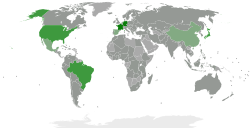
Back مؤسسة إسبرانتو العالمية Arabic Asociación Universal d'Esperantu AST Сусветная эсперанта-асацыяцыя Byelorussian Associació Universal d'Esperanto Catalan Světový esperantský svaz Czech UEA Danish Universala Esperanto-Asocio German Παγκόσμια Ένωση Εσπεράντο Greek Universala Esperanto-Asocio Esperanto Asociación Universal de Esperanto Spanish
Universala Esperanto-Asocio | |
 Logo of UEA | |
 Individual members by country
1-100 members
101-200 members
201-300 members
301-400 members | |
| Abbreviation | UEA |
|---|---|
| Formation | 1908 |
| Founder | Hector Hodler |
| Purpose | promote the use of Esperanto |
| Headquarters | Central Office |
| Location |
|
| Coordinates | 51°54′50″N 4°27′52″E / 51.9138°N 4.4644°E |
Region | World |
Official language | Esperanto |
President | Duncan Charters |
Vice-President | Fernando Maia |
General Director | Martin Schäffer |
Key people | Ivo Lapenna |
Main organ | Central Committee |
| Affiliations | UN, UNESCO |
| Website | UEA.org |
| Part of a series on |
The Universal Esperanto Association (Esperanto: Universala Esperanto-Asocio, UEA), also known as the World Esperanto Association, is the largest international organization of Esperanto speakers, with 5,501 individual members in 121 countries and 9,215[clarification needed] through national associations (in 2015) in 214 countries.[1][2] In addition to individual members, 70 national Esperanto organizations are affiliated with UEA. Its current president is Prof. Duncan Charters. The magazine Esperanto is the main publication to inform UEA members about everything happening in the Esperanto community.
The UEA was founded in 1908 by the Swiss journalist Hector Hodler and others and is now headquartered in Rotterdam, Netherlands. The organization has official relations with the United Nations and has an office at the United Nations headquarters in New York City.
- ^ List of countries with Esperanto speakers
- ^ La membraro de UEA en 2015, "Esperanto" 1301, april 2016, p. 94
